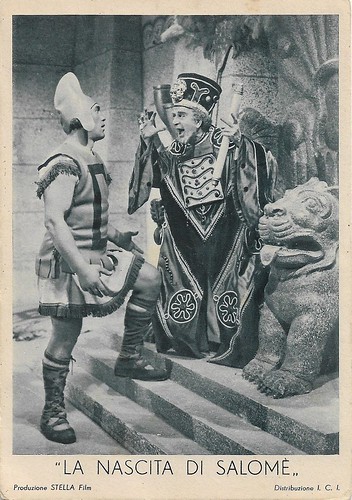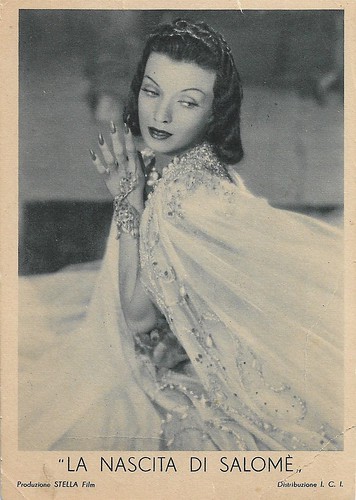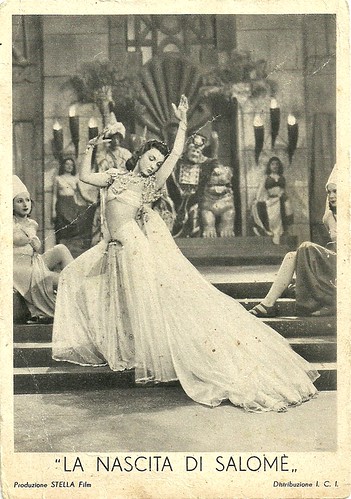
Italian postcard. Photo: Stella Film / I.C.I. Conchita Montenegro in La nascita di Salomè/The birth of Salome (Jean Choux, 1940).

Italian postcard. Photo: Stella Film / I.C.I. Conchita Montenegro in La nascita di Salomè/The birth of Salome (Jean Choux, 1940).

Italian postcard. Photo: Stella Film / I.C.I. Conchita Montenegro in La nascita di Salomè/The birth of Salome (Jean Choux, 1940).
A comedy set in Ancient times
La nascita di Salomè/The birth of Salome (Jean Choux, 1940) is a comedy set in Ancient times. Salomè was played by Conchita Montenegro, a Spanish model, dancer, and stage and screen actress who starred in several Spanish productions, but also in Italian, French, German and American films.
Nerio Bernardi stars as the king of the Parthians, a powerful ruler of ancient Persia.
He learns that the monarch of a small kingdom, Aristobulus (Armando Falconi), has married Salome, a beautiful dancer, and sends a messenger to offer him four provinces in exchange for his wife.
Aristobulus does not even dream of losing his Salome, who in reality has become a matron-like lady (Maria Gomez). He makes an agreement with a clever minister and sends him a substitute (Conchita Montenegro), carefully selected from among the beauties of his kingdom.
In this way a new Salome is born, a beautiful and skilful dancer, capable of captivating all men. All this is discovered by the envoys of the king of the Parthians but, fascinated, they pretend there has been no deception and bring the girl to their sovereign, who is very impressed and gives Aristobulus the promised provinces.

Italian postcard. Photo: Stella Film / I.C.I. Primo Carnera and Armando Falconi in La nascita di Salomè/The birth of Salome (Jean Choux, 1940). The back of the card offers a referendum on the two endings of the film, to be sent to the company Stella Film, Via Vittorio Veneto 116 in Rome.

Italian postcard. Photo: Stella Film / I.C.I. Conchita Montenegro in La nascita di Salomè/The birth of Salome (Jean Choux, 1940).
Big gimmick
The costumes of La nascita di Salomè/The birth of Salome (Jean Choux, 1940) were designed by Gino Carlo Sensani and Maria De Matteis. The cinematography was by Carlo Montuori.
Gino Carlo Sensani was the most important costume designer of the Italian cinema of the 1930s and 1940s, specializing in historical films. Maria De Matteis was his assistant before becoming an important costume designer herself in the 1940s and 1950s, e.g. for Malombra (Mario Soldati, 1942), Ossessione (Luchino Visconti, 1943), La carrozza d'oro (Jean Renoir, 1953), Carosello napoletano (Ettore Giannini, 1954), and War and Peace (1956) by King Vidor.
Carlo Montuori was one of the most productive Italian cinematographers, with a long career starting in 1913 and ending in 1961. Montuori was involved in many historical films in the silent and sound era including the silent version of Ben-Hur (Fred Niblo, 1925), but also divafilms, many 1930s comedies by Camerini, Bragaglia, Righelli and others, notable dramas such as Piccolo mondo antico by Soldati, and several films by Vittorio De Sica.
Osvaldo Scaccia in his review of La nascita di Salomè/The birth of Salome in Film n. 52, 28 December 1940: "The big gimmick should be the two endings. The producers have even announced a 'referendum' among the viewers to find out which of the two they prefer. In the first ending, suffused with intimate humanity, we see the good-natured king clinging affectionately to his wife.
In the second, with its Trio Lescano comedy, the melancholy king's ambassador falls in love with Salome and his companion exclaims - hilarity! - I said it myself that someone was going to lose their head. [...] Of the leading actors, I remember Armando Falconi who gives a great performance and Conchita Montenegro. [...] The dance she does in front of the ambassador of the melancholic king is one of the most evocative scenes in this excellent film and manages to make us forget the two endings."

Italian postcard. Photo: Stella Film / I.C.I. Conchita Montenegro in La nascita di Salomè/The birth of Salome (Jean Choux, 1940).

Italian postcard. Photo: Stella Film / I.C.I. Conchita Montenegro in La nascita di Salomè/The birth of Salome (Jean Choux, 1940).

Italian postcard. Photo: Stella Film / I.C.I. Armando Falconi in La nascita di Salomè/The birth of Salome (Jean Choux, 1940).
Sources: Wikipedia (Italian), and IMDb.
2 comments:
Conchita Piquer
Conchita Bautista
Post a Comment